Launched during Jobber Professional Development Day, Boost by Jobber will help launch, grow, and strengthen small home service businesses Jobber, the leading provider of home service management software, today unveiled Boost by Jobber, a grant program to further support the hard-working entrepreneurs within the home services sector. Aspiring entrepreneurs, new business owners, and longtime home Read more
Jobber

Launched during Jobber Professional Development Day, Boost by Jobber will help launch, grow, and strengthen small home service businesses
Jobber, the leading provider of home service management software, today unveiled Boost by Jobber, a grant program to further support the hard-working entrepreneurs within the home services sector. Aspiring entrepreneurs, new business owners, and longtime home service entrepreneurs are invited to apply for free grants ranging from $1,000 to $20,000 depending on the category their business qualifies for. Twenty home service businesses across 50+ industries such as lawn care, plumbing, residential cleaning, and painting, will be awarded $100,000 in total. Applications are now open through May 5, 2021. Finalists will be announced in July 2021 with the list of winners announced in August 2021.
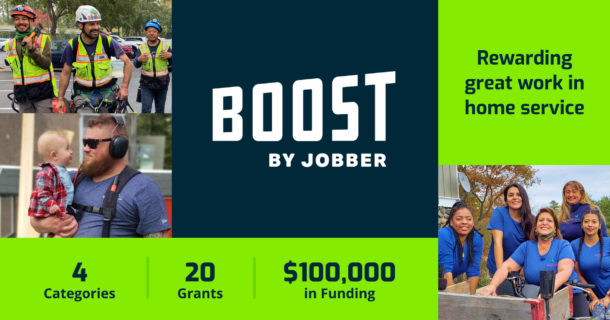
“Home service entrepreneurs impact their local communities and neighborhoods in meaningful ways,” said Sam Pillar, CEO & co-founder at Jobber. “They employ millions of people while operating behind-the-scenes to keep homes, offices, and other spaces safe and in good working order—yet, despite their important contributions, small businesses are largely underserved when it comes to business financing. Boost by Jobber helps address this gap by providing service business entrepreneurs with some extra working capital that may not otherwise be available through traditional banks and government grant programs.”
Royce Ard, who owns My Amazing Maid with his wife, Tamara, further validates this statement. “Typically when I see a grant, I’m almost always assuming it’s for a specific cohort and I wouldn’t qualify,” explained Ard. “Loans are very, very, very hard to get. As far as going to a bank and getting $10,000 for a small business like ours, you’re not going to get it.”
Boost by Jobber grants are organized into categories that reflect various stages of company growth, from ideas on paper to recently launched ventures to established businesses—as well as an additional category for COVID-19 support. Five winners will be selected from each of the following:
- Almost-entrepreneurs (pre-business): Those who have the drive to start and run a home service business, but need funds to get started.
- New business owners (0-3 years): Entrepreneurs who are in the early stages of building their team, client list, and services.
- Experienced business owners (3+ years): Entrepreneurs who are ready to scale their mature business to the next growth stage.
- COVID-19 support: Entrepreneurs seeking financial support or resources for their team’s well-being.
Jobber spoke with dozens of service professionals to better understand the impact extra cash flow could have on a business, to create the grant categories, and to determine the dollar values assigned to each grant. Whether a company is looking to purchase new equipment, increase marketing dollars, launch a new service, train teams, or is in need of financial relief, funds from the Boost by Jobber program can make a big difference in helping small business owners be more successful.
“People don’t understand the value of the cash flow,” stated Steven Knight, Partner at Mosaic Home Services Ltd. “It’s not necessarily only helping the business. It’s helping the business owners. Their ability to lead people and calm down. Cash flow helps them be a better business leader.”
Boost by Jobber is one of many initiatives within Jobber’s home service ecosystem that is dedicated to supporting the home service entrepreneur, whether it’s through the company’s award-winning business management software, resources such as Jobber Academy, community building via the company’s Entrepreneurship Group on Facebook, and more.
To learn more about Boost by Jobber or to apply, visit: http://boostbyjobber.com.

The husband and wife team will present “Building a Resilient Mindset” at the free virtual event for home service professionals Jobber, the leading provider of home service management software, released the full agenda for Professional Development Day, its free virtual conference, presented by Visa, taking place on March 24 from 10:00 am to 2:30 pm Read more
The husband and wife team will present “Building a Resilient Mindset” at the free virtual event for home service professionals
Jobber, the leading provider of home service management software, released the full agenda for Professional Development Day, its free virtual conference, presented by Visa, taking place on March 24 from 10:00 am to 2:30 pm ET. Joining the speaker lineup, which includes keynote presenter Gary Vaynerchuk, are Julie Ertz, Olympian and two-time World Cup champion for the U.S. Women’s National Soccer Team, and husband Zach Ertz, Super Bowl LII Champion and NFL Pro Bowler. Six-time best-selling author of “Fix This Next” and “Profit First,” Mike Michalowicz, and futurist and marketing expert, Crystal Washington, were also added to the event agenda. The event will provide small business owners and their management teams with valuable lessons around people, profit, and process, so that they’re better equipped to tackle day-to-day challenges and improve efficiencies in their service business.

Julie Ertz, Olympian and two-time World Cup champion for the U.S. Women’s National Soccer Team
Registration for the free event is now open: getjobber.com/pdday2021. All registrants are automatically entered to win a set of team tablets, an iPhone 12, new team uniforms, and custom vehicle graphics. Attendees who sign up before March 5 will also qualify to win the early bird prize—a new MacBook Pro laptop.
“Jobber PD Day’s roster of speakers, from prolific authors to world-class athletes, know what it takes to reach the top of their respective fields,” said Sam Pillar, CEO and co-founder of Jobber. “We’ve worked one-on-one with speakers to customize their training to the specific challenges home service entrepreneurs face, to ensure the time they spend at Jobber PD Day will give them immediately useful takeaways.”
The closing keynote session, “Building a Resilient Mindset: A Conversation with Zach and Julie Ertz,” will feature real-world advice for developing and strengthening the most important personal qualities that both athletes and entrepreneurs need to succeed and power through challenges and setbacks. The presentation will cover the Ertzs’ approach to breaking big goals into smaller milestones, how to move on from setbacks, and advice for couples navigating demanding professions.

Zach Ertz, Super Bowl LII Champion and Pro Bowler
Mike Michalowicz will present “Fix This Next: Make the Vital Change that Will Level Up Your Business.” Before age 35, Mike founded and sold two multimillion-dollar businesses, became an angel investor, and then lost it all. Now, Mike is devoted to developing strategies for building healthy, strong companies. His Jobber PD Day session will outline how to utilize his Clockwork system for identifying your largest problems and overcoming your biggest hurdles.
Crystal Washington is a technology strategist and certified futurist who has advised Fortune 500 companies including Google, Microsoft, and GE. She’s known for taking complex digital topics and making them accessible to everyone. In her session, “Nurturing Relationships for Business Success,” she will explain how the key to long-term recovery and growth is nurturing relationships. Crystal will share the Dos and Don’ts of reaching out to clients when stress-levels are in the red, and advise participants on tech tools they can implement to impress peers, clients, partners, and prospects.
To learn more and to register for Jobber PD Day, click here.

Jobber’s 2020 Home Service Economic Report highlights the COVID-19 pandemic’s initial impact on Home Service, as well as the category’s path to recovery Jobber, the leading provider of home service management software, today released the Home Service Economic Report: 2020 Review, which showcases market trends and insights pertaining to the performance of the Home Service category Read more
Jobber’s 2020 Home Service Economic Report highlights the COVID-19 pandemic’s initial impact on Home Service, as well as the category’s path to recovery
Jobber, the leading provider of home service management software, today released the Home Service Economic Report: 2020 Review, which showcases market trends and insights pertaining to the performance of the Home Service category throughout 2020. Although Home Service experienced a significant decline in year-over-year growth in March and April when stay-at-home directives were implemented across the U.S., the category ended the year exceeding pre-pandemic growth levels.
According to the report, median revenue in Home Service saw consistent positive growth beginning in June, and reached a record high for the year in December with 23% growth year-over-year. New work scheduled, an early indicator of the health of Home Service businesses, peaked in June with 17% growth year-over-year, then continued to see consistent positive growth throughout the second half of the year.
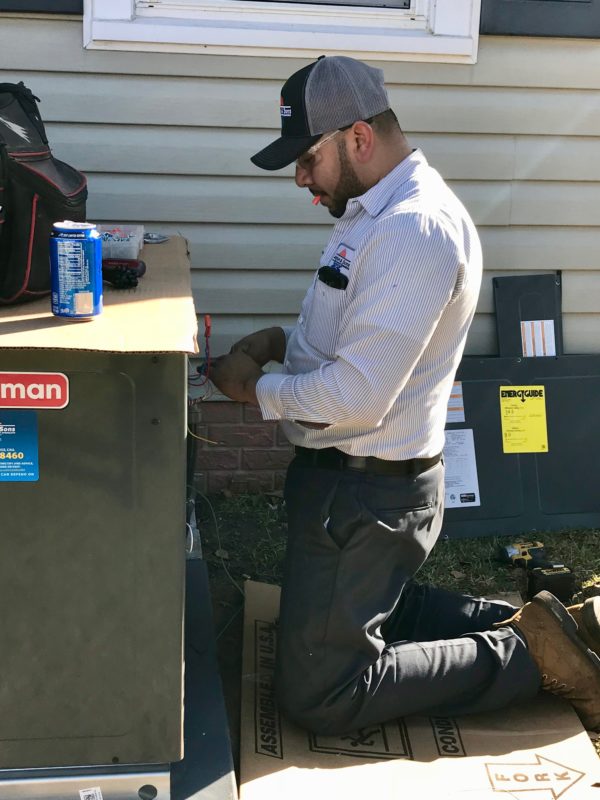
“While so many small businesses were sadly forced to close shop in 2020, most Home Service businesses endured,” said Sam Pillar, CEO and co-founder of Jobber. “All the major metrics we track for Home Service, including consumer demand, employment and revenue, point to an overall category recovery as we kick off 2021. If 2020 is any indication, service providers are a resilient group that can overcome challenges that may surface in the year ahead.”
Jobber’s Home Service Economic Reports are compiled using proprietary data aggregated from over 100,000 Home Service professionals that use the platform. That data, along with various sources of government data, are used to assess the performance of the Home Service category, and compare it against other major categories (Restaurants, General Merchandise Stores, Automotive, Clothing Stores, and Grocery Stores). The report also provides insights into key segments such as Cleaning, Contracting, and Green; and looks into industry trends related to technology adoption and how they are affecting Home Service businesses’ ability to get work, do work, invoice and get paid.
Key findings from the report include:
- Home Service has proven to be resilient—Despite its initial decline, Home Service has proven to be one of the most stable categories aside from Grocery Stores and General Merchandise Stores amidst economic uncertainty.
- Consumers spending more on Home Service—Sparked by renewed homeowner interest to improve indoor and outdoor living spaces, consumer spending in Home Service out-performed most major categories in the second half of 2020, compared to the same period in 2019.
- Technology adoption on the rise—Digital work requests saw accelerated growth through 2020 after a decline in March and April. Data also shows an increase in electronic customer communication in the form of visit reminders, which saw 30% year-over year growth in April and May, despite the fact that actual visits declined during this period.
- Online payments continue to grow—Consumer payments with credit and debit cards grew faster than overall revenue growth in the second half of 2020.
- Commercial cleaning outperformed residential—Residential cleaning was the industry most impacted by the COVID-19 pandemic, while commercial cleaning contract work was comparatively stable.
- Contracting warranty services showed stability—Warranty services proved to be the most steady type of work in the Contracting segment while inspection/consultation for new work was the most volatile.
- The Green segment experienced record growth—The Green segment, which includes landscaping, lawn care, and other outdoor services, is the only segment that saw year-over-year growth in median revenue every month during 2020. This growth accelerated in Q4, hitting a record 32% year-over-year growth in December.
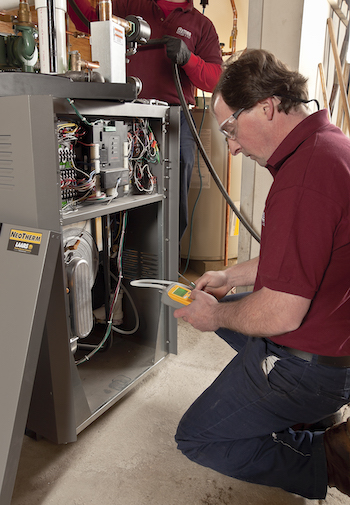
“When the COVID-19 pandemic hit back in March, we weren’t sure how our customers’ businesses would perform,” said Abheek Dhawan, VP, Business Operations at Jobber. “Although service businesses experienced record declines at the onset of the pandemic, they managed to weather the storm rather effectively to end 2020 on a positive note. It’s especially promising to see the increase in technology adoption, as it means that not only are service professionals surviving, but also further investing in their businesses. We suspect that the trend towards technology adoption, which has accelerated due to the pandemic, will continue into 2021 and beyond.”
To download the Home Service Economic Report: 2020 Retrospective, visit: https://getjobber.com/home-service-reports/january-2021/

Jobber’s Latest report reveals full quarter of positive year-over-year revenue growth for Cleaning, Contracting, and Green segments Jobber, the leading provider of home service management software, today released the Home Service Economic Report: Summer Edition, which showcases market trends and insights pertaining to Home Service businesses in the first three quarters of 2020. Year-to-date, the Home Read more
Jobber’s Latest report reveals full quarter of positive year-over-year revenue growth for Cleaning, Contracting, and Green segments
Type of Work Performed – Contracting (YoY)
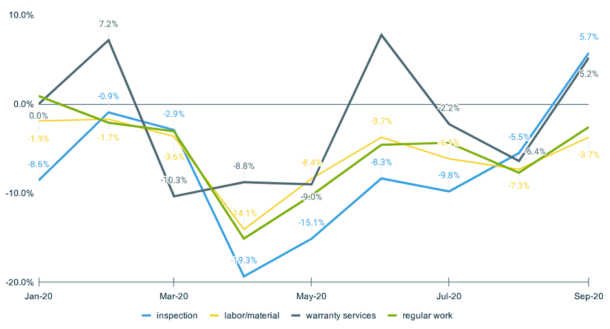
Category Comparison YoY (Q3 2020)
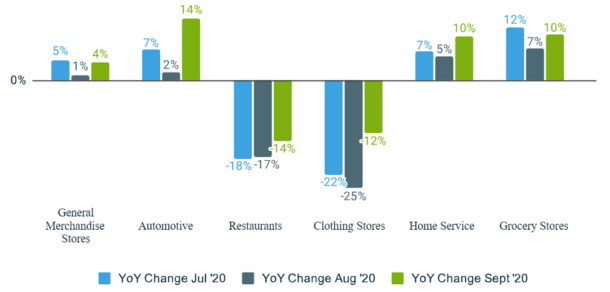
Jobber’s Home Service Economic Reports are compiled using proprietary performance data aggregated from the 100,000+ home service professionals the platform serves. Category performance is also compared to other major categories for context. New to this quarter’s report is data revealing trends in type of work completed, digital payment adoption, and consumer communication. Key findings from the summer report include:
- New Work Finds Pre-Pandemic Success—New-work-scheduled started to show signs of recovery from May onwards, hitting a record high for the year in June with 17% growth year-over-year. The growth continues to look healthy year-over-year in Q3, exceeding pre-COVID levels.
- Employment Growth Sees Upward Trajectory—Compared to Total Nonfarm employment growth, which saw an average decline of around -7% year-over-year in Q3, Home Service fared much better with a decline of around -4%. The category has seen rapid recovery, starting with a decline of -12.9% in April to -4.9% year-over-year in June 2020, followed by continued improvement in Q3.
- Home Service Outperforming Most Categories—With the exception of Grocery Stores and General Merchandise Stores, Home Service was the most stable category through the peak of the pandemic. It has also recovered very well through June and Q3 compared to others such as Clothing Stores and Restaurants.
- Electronic Payments On the Rise—From January to May, there has been a 5% increase in e-payment collection when compared to other methods such as cash or cheque, which can be largely attributed to social distancing measures that came into effect earlier this year.
Consumer Spending Comparison YoY
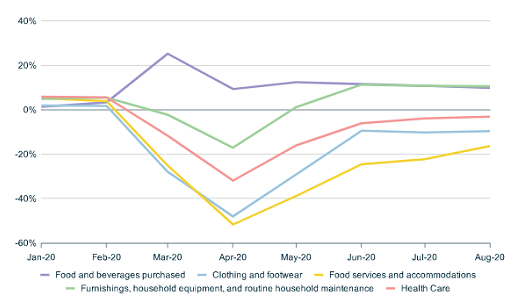
“Analyzing measures such as consumer demand, employment, and revenues, we see encouraging results for the Home Service category,” said Abheek Dhawan, VP, Business Operations at Jobber. “Home Service businesses have rebounded better than most other categories, and it’s fair to say that businesses and consumers remain optimistic, but cautious, as we enter the final quarter of 2020.”
To download the full Home Service Economic Report: Summer 2020 Edition, visit Jobber Homes Services Report.
